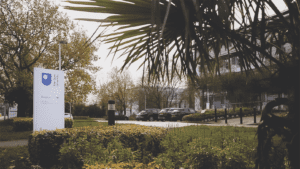For over 50 years, The Open University has been at the forefront of distance learning technology, and over that time it has helped over two million students pursue their ambitions. It is also a head- line sponsor for the Milton Keynes Business Achievement Awards (MKBAAs), and here, Viren Patel, Director of Employers and Partnerships, discusses how the awards’ theme this year, around bridging the skills gap, resonates with the organisation…
The Open University has been a long-time supporter of the MKBAAs. As a headline sponsor, what benefits does the organisation see?
The Open University works with around 80 employers in Milton Keynes, offering flexible, work-based learning to employees. In addition to this, we are a major local employer ourselves and play a part in the local business and education community. The awards allow us to keep connected with the successes and innovations of local businesses and grow our visibility as a flexible provider of education and quality academic research.
 This year’s theme for MKBAA is ‘Bridging The Gap: Skills & Learning for Our Future Workforce’ – as the global leader in distance learning facilities, how does this theme resonate with The Open University?
This year’s theme for MKBAA is ‘Bridging The Gap: Skills & Learning for Our Future Workforce’ – as the global leader in distance learning facilities, how does this theme resonate with The Open University?
The Open University is closely plugged into the skills challenges that employers face. Our Business Barometer 2024 report, published in partnership with the British Chambers of Commerce, found that more than six in ten employers are experiencing skills shortages. A concerning 68% reported this caused workload challenges and 64% said they were not confident in the key areas of either AI or green technologies.
Another OU report, Powering Up Productivity, found that four in ten businesses said skills shortages negatively impacted productivity. Skills are absolutely central to business success and employers, policymakers and providers have to work together to deliver relevant learning and development that can immediately applied to the workplace.
With the OU’s mission to make learning accessible to all, how can this help to upskill our future workforce?
The Open University has helped to close the skills gap locally and nationally for more than five decades. Our open access ethos means that prior qualifications are not needed for most qualifications and the flexible nature of the delivery means that wider cohorts are able to access the learning programmes around other commitments. Seven in ten OU students are already in work which shows we attract a different type of learner to traditional universities.
The Business Barometer found that almost two-thirds of employers do not have a specific training or recruitment initiative for underrepresented groups within the workforce or local community. This includes people with disabilities, those with childcare responsibilities, armed forces veterans and people from other diverse backgrounds. This is a huge untapped resource of skills and the OU has been able to work with many employers to unlock the potential in these cohorts through our flexible approach to education.
How do you see businesses and educational establishments working together to help the skills shortage situation over the coming years?
It’s really important that business and education providers work together to give the opportunities to employees who wish to reskill and upskill themselves. We work with more than 2,700 employers across the UK, and I have seen at close quarters how these partnerships benefit staff teams, driving attraction, high engagement, high productivity, diversity and inclusion and better retention. That’s why organisations such as IBM, Uber and Deloitte work with us, along with hundreds of local authorities and trusts and health boards across the four UK nations.
Providers must also work together to expand their reach and provision across the country and globally. The Open University is able to validate the provision of higher education delivered other institutions without UK degree awarding powers, such as Further Education colleges.
The breadth and depth of the courses available through the OU are second to none. How can the opportunities these courses bring be harnessed to help upskill our own internal workforce?
This can be done in a variety of ways – including flexible degrees such as our Open qualifications, which offer interdisciplinary undergraduate or postgraduate study shaped around an employee’s career aspirations and interests.
The apprenticeship levy, which will be replaced by a new growth and skills levy, has also offered employers the opportunity to upskill and reskill new and existing employees at various different ages and educational levels.
In England, the OU offers apprenticeships in digital, nursing and social work, which utilise the levy to plug critical skills gaps that employers have identified.

The country’s skills shortage featured in Labour’s manifesto, but is the dialogue often lost within Government pledges and newspaper reports and how can SMEs cut through this noise?
In many of our employer surveys, we see business size as key when it comes to solving skills challenges. Many smaller businesses struggle to find the time to measure productivity, create skills plans, adopt new technologies or train their managers.
This is perfectly understandable as many small business leaders and owners are wearing multiple hats and struggle to find the time to focus on strategic issues beyond the day-to-day. I would always recommend that smaller businesses start small and take a few small steps to tackle skills challenges.
How important is it for local business communities to share best practice and come together to tackle the shortage?
At the OU, we foster learning between businesses through our own events, such as Elevate Equity (business.open.ac.uk), where businesses learn how they can create a more equitable workplace and hear from different employers and organisations who are leading in this area. Providing these forums is really important for the OU nationally and locally, given our unique viewpoint as a major national and international provider working across multiple sectors and geographies.
The MKBAA awards offer a great opportunity for businesses in Milton Keynes to come together to share experiences and best practice.
Learn more about the few remaining sponsorship opportunities for the Milton Keynes Business Achievement Awards 2025.
Follow the Milton Keynes Business Achievement Awards on X/Twitter and Instagram and join the discussion on LinkedIn.













